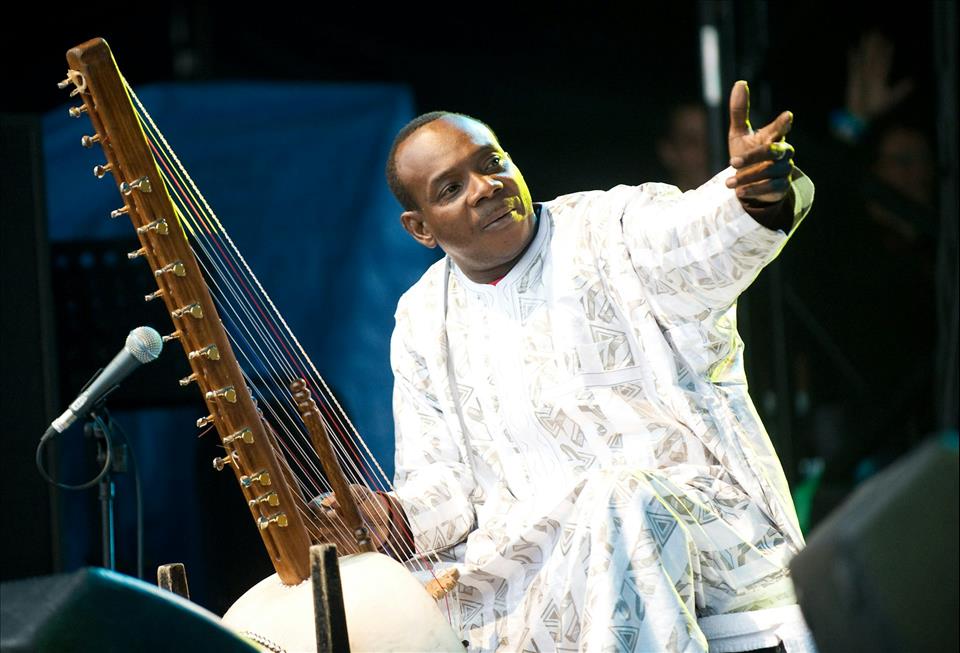
Toumani Diabaté: The Famed Musician From Mali Who Took The Kora To The World
The world has lost a significant musical ambassador for the Mande people of west Africa – the virtuoso kora player, composer, and collaborator from Mali, Toumani Diabaté . He died on 19 July, just short of his 59th birthday, at the peak of his career.
When Toumani was born in Bamako in 1965, neither his surname Diabaté or his instrument, the kora , an iconic 21-stringed African harp, were familiar to anyone outside the Mande region .
By the time Toumani passed, his father Sidiki Diabaté Sr had been known as“the king of the kora” and Toumani himself was world famous, representing the same mastery of the kora as his father but infusing his compositions with improvisation and with contemporary influences, collaborating with artists from a wide range of similar music traditions around the world. His son Sidiki Jr's star would be on the rise.
Read more: Kora: in search of the origins of west Africa's famed stringed musical instrument
Kora players like the Diabatés have emerged from a centuries old tradition, the jelis or griots (historians, storytellers and musicians) of west Africa. He could trace his family line back to the time when the Mande empire (1226-1670) controlled part of west Africa, over 70 generations ago.
As a scholar of the music of the Mande people, I have traced Toumani Diabaté's music and influence for decades and join Malians in celebrating his astonishing contemporary legacy.
Early yearsWhen Toumani was only seven, in 1971, the Mali government released a set of six vinyl disks, Prémiere Anthologie de la Musique Malienne , which featured the most renowned professional musicians of the day. One of them was his father. Following in his father's footsteps, Toumani was destined to rise to fame.
A young Toumani Diabaté.
He first travelled abroad in 1987 to perform as a member of his father's ensemble at a festival in London organised by scholar and musician Lucy Durán . By this time the classic Mande music, known as jaliyaa , had become more widely known to the world through numerous album releases and tours by musicians.
JaliyaaJaliyaa is a kind of music centered on courtly praise for the achievements of heroes past and present. It's typically sung by powerful male and female voices and accompanied by the kora, the ngoni (a slender lute), and the bala , a xylophone. Until the mid-1900s, jaliyaa was a profession pursued almost exclusively as an inherited family tradition, with the names Diabaté, Kouyaté and Sissoko (Suso) being the most familiar. The audience was mostly defined by the leading families in Mande history, who served as patrons of the music.
Playing kora with his son Sidiki.
Toumani was born into this tradition at a time when waves of change were coming, opening up both the profession and the audiences. He rode at the top of this wave. After his 37-year career, if anyone has heard of the kora, the name Diabaté, or the Mande people, it is very likely that it is from something Toumani had achieved.
Improvisation and collaborationToumani chose not to sing, but to concentrate on the potential for improvisatory beauty that the kora itself represents. Having learned the traditional repertoire – basically a long list of song accompaniments that can also be played as solo instrumental pieces – he focused his attention on his own style of flowing improvisation (creating music spontaneously). And on how the resulting sound might lend itself to collaboration with musicians from other improvisatory traditions of the world.
Collaborating with Ali Farka Touré.
His tireless curiosity led him to produce 14 commercial releases – from his straightforward 1988 solo album Kaira , to his last, The Sky is the Same Colour Everywhere , a 2023 collaboration with the Iranian musician Kayhan Kalhor .
In between were collaborations with flamenco musicians, US blues guitarist Taj Mahal , US jazz trombonist Roswell Rudd , Brazilian poet Arnaldo Antunes , Brazilian rock guitarist Edgard Scandurra , and US banjo virtuoso Béla Fleck .
He also produced many albums with fellow Mande musicians, most notably Ali Farka Touré , Bassekou Kouyaté , Ballaké Sissoko , his son Sidiki Diabaté , and his own ensemble, the Symmetric Orchestra . He even recorded an album with the London Symphony Orchestra.
Global legacyToumani's achievements have been duly celebrated, with two Grammy Awards , recognition as a UN goodwill ambassador for drawing attention to the HIV/Aids crisis through his music, and an honorary doctorate .
With his band Symmetric Orchestra.
His legacy will be the dual accomplishments of being a virtuoso traditional kora player and also a leader in the development of international music styles through his good-hearted collaborations with so many other musicians. As British journalist Robin Denselow has noted , Toumani and his achievements now occupy our heads as much as we might remember Ravi Shankar for his promotion of Indian music in the late 1900s.
Toumani, the kora, the Mande people – we now know these as familiar words and sounds, thanks to Toumani.
-
Mali
Grammy Awards
Music history
African music
Traditional music
Mali music
kora
Mande
West African music
Africa Grammy
African musicians

Legal Disclaimer:
MENAFN provides the
information “as is” without warranty of any kind. We do not accept
any responsibility or liability for the accuracy, content, images,
videos, licenses, completeness, legality, or reliability of the information
contained in this article. If you have any complaints or copyright
issues related to this article, kindly contact the provider above.


















Comments
No comment